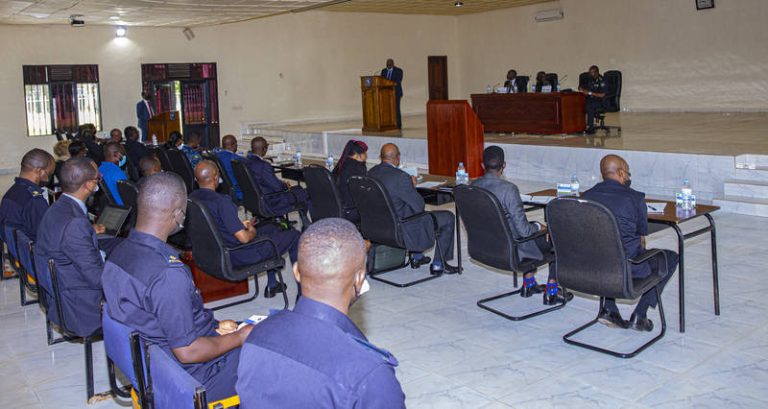
A week-long training of the African Union Operational Guidance Notes (OGN) on Disarmament, Demobilisation and Reintegration (DDR) and Arms Control started at the Police Training School (PTS) Gishari.
It brings together 18 participants from Burundi, Central African Republic (CAR), Democratic Republic of Congo (DRC), Ethiopia, South Sudan, Uganda and Rwanda.
It is organized in partnership with the Regional Centre on Small Arms (RECSA) and the United Nations Institute of Training and Research (UNITAR).
The Deputy Inspector General of Police (DIGP) in charge of Operations, Felix Namuhoranye, while officially opening the training, said that proliferation of small arms and light weapons fuel conflicts, undermines political stability, and has devastating impacts on human and state security.
“Sustainable development cannot be achieved in the absence of peace and security. One way of guarantying them is the control of the proliferation of small arms and light weapons, which have been found to sustain armed conflict, instability, terrorism, cattle-rustling and other serious crimes in the region,” DIGP Namuhoranye said.
To prevent proliferation of arms, RECSA undertook different strategies which include the training on Disarmament, Demobilization and Reintegration (DDR) and Arms Control.
To support these strategies, Rwanda National Police allocated a site at PTS Gishari for the construction of the specialized training centre on Small Arms and Light Weapons.
“We believe that this centre will help in enhancing capacity building of member states through regular training,” DIGP Namuhoranye observed.
Lt. Gen. Badreldin Elamin Abdelgadir, the Executive Secretary for RECSA said that RECSA has developed Best Practice Guidelines on Practical Disarmament to ensure that disarmament interventions are comprehensive, people sensitive and address the root causes of armament among communities.
“The tragedies caused by proliferation of small arms and light weapons in our countries continue to be a matter of concern. Armed violence cases dominate newspapers on a daily basis. Though the context and circumstances may vary, the lethal consequences have always been very devastating,” said Lt. Gen. Badrelardin.
The AU Commission Representative, Christophe Kayoshe noted that the training will illustrate how poor management of weapons have had a catastrophic impact on human rights and infrastructure.
He added that poor management of ammunitions contribute to the threat of proliferation.
This, Kayoshe added, requires to improve oversight in accountability and peace particularly after demobilisation, and how the weapons are controlled to prevent falling in the hands of non-state actors and terrorist groups.
“The issue of small arms and light weapons is a serious concern for conflicts on our continent where terrorist groups have accessed weapons in illegal means,” Kayoshe said.
He added: “We adopt mechanisms to assist member states that are facing operations and capacity challenges through the support of weapons and ammunitions management capabilities, and to ensure that member states have ownership of weapons and how they manage them.”
He further called for coordinated efforts in the region and among law enforcement agencies to correctively leave no room for terrorists to access arms. (End)
